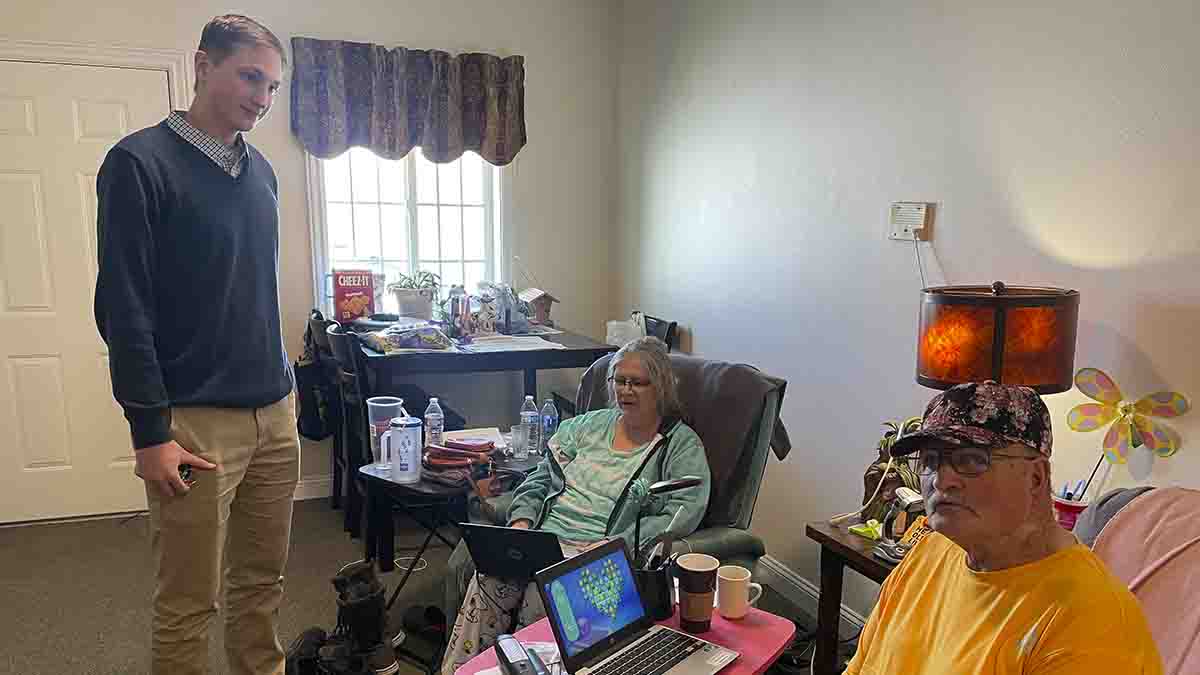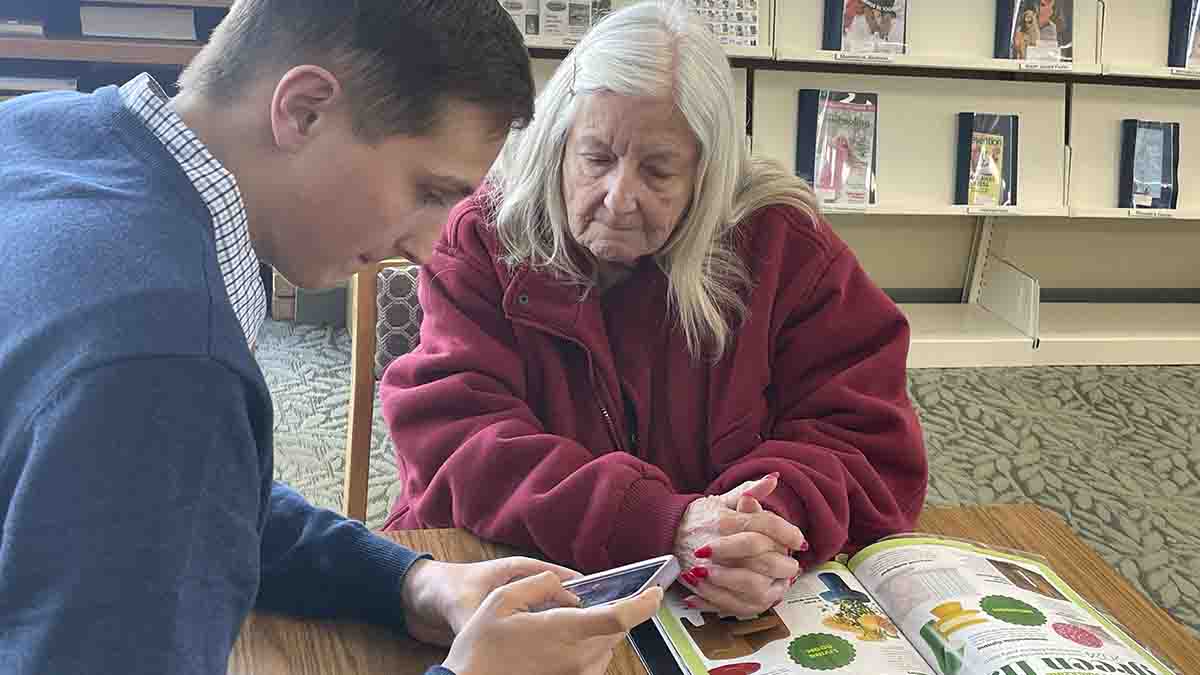Digital Miracle Workers
Ray and Tammy Nash have reconnected with out-of-state family members and are back in daily communication with their children following 21-year-old Britton Bolgen’s January 2024 visit to their American Falls assisted living center.
Bolgen, who is serving as an AmeriCorps member with University of Idaho Extension’s Digital Economy Program (DEP), announced to the Nashes and others in the Edgewood Spring Creek dining room that he’d give a used Chromebook laptop to anyone willing to meet with him for a few hours of free beginner computer training.
The aim of DEP is to reduce the digital divide, or gap between those who have access to the internet and reliable devices and those who do not, by teaching rural Idahoans basic computer skills, and the results can be life changing for participants.
UI Extension’s three regional DEP coordinators oversee a group of 10 AmeriCorps workers, including Bolgen, who take creative approaches to teaching digital literacy within their assigned communities. The program also encompasses a Remote Work Professional Certificate course, which teaches participants how to use technology to successfully work from home.
The Nashes had no way of connecting with loved ones, aside from in-person visits and using the Edgewood Spring Creek business phone, after they let their cell phone plans lapse to cut costs. Now they have the technological wherewithal to chat with friends and family whenever they want via Messenger, which Bolgen helped them download onto their Chromebooks.
“That’s how I communicate with my kids. They think it’s great,” said Tammy Nash. “I communicate with my sisters who live in Eugene, Oregon, and I can communicate with my sister who lives in Medford, Oregon.”
Mastering modern technology has been especially challenging for Ray Nash, and he’s appreciated Bolgen’s willingness to repeatedly explain the same concepts.
“I’ve had some things that were messed up and he says, ‘It’s OK. Let me show you how to do this,’” Ray Nash said while playing a puzzle game, Bejeweled, on his Chromebook. “He’s got the patience of Job.”
Bolgen sends daily reports of his work activities to the program’s southeast Idaho regional director, Monica Hampton. The program is facilitated by Stephanie Guyton in northern Idaho and Kathryn Leach in southwest Idaho.
Bolgen joined the program in January 2024 after returning from a mission to Bosnia-Herzegovina with the Church of Jesus Christ of Latter-day Saints, and he plans to enroll in nursing school after his current term of service with DEP wraps up in August. He learned of the opportunity through Randy Jensen, superintendent of the American Falls School District.
“He’s the perfect person for the job because he’s very kind and very patient,” Jensen said. “He’s very ambitious, too. He’s taken the initiative to find people he can help and serve.”
The school district retires students’ personal Chromebooks after five years in service. Jensen has been giving them to Bolgen, who wipes the hard drives and uses them to recruit community members for his training program. He’s given away more than 60 Chromebooks so far.
Bolgen personally developed the curriculum he teaches, covering how to set up an email account, how to video chat, how to configure a Chromebook, basic keyboard functions and other skills.
Jensen was impressed that Bolgen attended the district’s parent-teacher conference night, during which he helped 26 families sign up for $1,000 stipends per child totaling $48,000 for his community toward internet service and other eligible educational services and devices through the Idaho State Department of Education’s Empowering Parents grant.
Bolgen keeps an office at the school district’s Community Center, where he teaches technology classes starting at 6 p.m. every Tuesday. He also offers classes at American Falls District Library. To recruit participants, he sends emails to school district parents and makes his pitch at local gathering places, such as lunchtime at Power County Senior Center. Sometimes, he dines with the seniors to field questions about computers, cell phones and technology in general.
“It is so rewarding just seeing the smiles on people’s faces when they finish those trainings and they get to keep those Chromebooks. I had a lady give me a hug out of nowhere,” Bolgen said. “I can’t imagine what it would be like if this position wasn’t in American Falls, just because of the huge difference it has made in the community.”
During a recent Friday afternoon class at the library, Bolgen answered technology questions from a small group of students. He helped Janis Carlson unlock the secrets of a smartphone she’d had for more than a year but was still learning to use.
Denise Miller helped train her 91-year-old father-in-law, who took home one of Bolgen’s Chromebooks.
“He did not want a Chromebook but we got him one anyway, and now he loves it. It actually has changed his life,” Miller said. “He plays solitaire and he listens to old country music that he can’t get on the radio.”

Overcoming a Stroke with Technology
A woman who came to the Salmon Public Library seeking assistance from DEP AmeriCorps member Mckenzie Davis was robbed of her ability to have a conversation when she had a stroke about seven years ago.
Davis, who serves Lemhi County, has helped the woman adapt to a new way of communicating using technology.
Since the stroke, the woman, who requested anonymity, hasn’t been able to speak or comprehend spoken words. She’s maintained the ability, however, to relay her thoughts in text and to understand written words.
Davis installed an app on the woman’s cell phone that transcribes audio communications into text, which has enabled her to resume face-to-face and phone conversations. Davis also downloaded the Google Voice app on the woman’s computer to transcribe Zoom discussions, thereby enabling her to participate in online support groups for stroke survivors using typing and subtitles.
“She was almost in tears about how much it’s helped her communicate better because I don’t think she knew another way around this,” Davis said.
Davis has been drawing increasingly large crowds to her technology help sessions every Tuesday from 10 a.m. to 2 p.m. at the library. People often come to solicit help with filling out the online application for Medicaid benefits. She also teaches Excel, basic computer skills, how to work a cell phone and even how to print return labels for online purchases.
“There are a bunch of people in Salmon who are lacking digital skills. I came up with this idea of Tech Tuesdays at the library,” Davis said. “I didn’t expect it to explode as much as it did.”
Davis, 24, has visited with library administrators about continuing the service as a volunteer once her AmeriCorps term of service with the DEP concludes in July.
“The end of this project makes me sad because I think there’s still a need in this area for this resource,” Davis said.
Bridging the Workforce Digital Divide
U of I partners with Utah State University (USU) to offer the four-week, online Remote Work Professional Certificate, which is one of DEP’s other major prongs.
Participants complete virtual learning modules offered by USU, which prepare them to work remotely and remain in their rural communities. DEP staff grade homework, oversee breakout rooms and provide direct support to Idaho participants.
“We do start introducing tools that might be used by businesses so they can get familiar with something they may not be familiar with,” said Amber Smyer, DEP manager.
The Idaho Legislature authorized $1.3 million in federal American Rescue Plan Act funding toward the three-year program. Ten cohorts with up to a dozen students each have completed the certificate program since it launched in November 2022. UI Extension subsidizes the enrollment costs, charging $100 for residents of the state’s six most populated counties and $50 for veterans, low-income participants and residents of rural counties.
The certificate program has drawn mostly women seeking greater flexibility, including young mothers, caregivers of aging parents and retirees seeking a new income stream. Other participants look to bolster skills for jobs they already have.
“The goal is to get people online,” Smyer said. “By focusing on supporting those Idahoans who cannot fully participate in programs or services in our increasingly digital society and economy due to lack of digital access, skills and confidence we can empower them to engage with our resources that support improved quality of life.”

Article and photos by John O’Connell, College of Agricultural and Life Sciences
Published in March 2024








